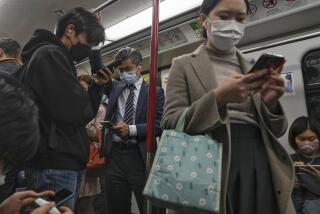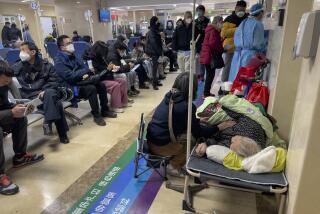Fear of Disease Turns Hong Kong Into a Surreal City of Untouchables
- Share via
HONG KONG — A killer virus is on the loose in this former British colony, and nowhere feels safe anymore, not even a house of worship.
During Mass on Sunday at St. Joseph’s Cathedral, everybody wore surgical masks, and no one complained that many of Roman Catholicism’s signature rituals were scrapped or modified.
Worshipers looked like a choir of dental hygienists as they sang muffled hymns through white or green cloth squares that obscured their mouths, noses and cheeks. Priests administering Communion dropped wafers not onto parishioners’ tongues but onto their palms. The faithful then turned away to lift their face covers, swallow the bread and refasten their masks.
During the bonding moment when everyone in the pews typically shakes hands and hugs, no one did either. Instead, the congregants bowed their heads toward one another like characters in an old Chinese movie.
Even the font for holy water at the entrance of the church stood dry.
It was all part of a new way of life in Hong Kong, where fear of the deadly flu-like disease spreading from Asia to the rest of the world has turned a vibrant metropolis into a city of untouchables.
So far, the strange illness known as severe acute respiratory syndrome, or SARS, has claimed 96 lives around the world and sickened as many as 2,600 people. By far the worst-hit city has been Hong Kong.
As of Sunday, 22 people in the territory had died and 842 had fallen ill. Schools have been closed, and hundreds of residents in one infected apartment block have been sent away to quarantine camps. Even their family pets -- cats, dogs, turtles and hamsters -- have been rounded up as part of a desperate search for medical clues.
Nearly a month after the mystery illness redrew the boundaries of human contact for this island of 7 million, there’s little sign that its killing streak is on the wane. On Sunday alone, two people died and 42 more became infected. The Hong Kong Hospital Authority’s chairman, Leong Che-hung, said his agency was bracing for the possibility of up to 3,000 cases by month’s end.
Also Sunday, Beijing reported the first case of a foreigner dying of the disease -- a 53-year-old Finn. In addition, the government announced five more Chinese fatalities, pushing the mainland’s death toll to 52.
Yet here in Hong Kong, people carried on, even if nothing seemed quite the same.
Turning on the TV, you could spot a government-sponsored commercial giving viewers instructions on how to greet one another in public.
“Avoid shaking hands. Say hi and wave goodbye,” the announcer says, as two actors in Western suits clasp their own hands in a traditional Chinese gesture of goodwill.
“Wash hands before putting on the mask. Avoid touching public installations,” the ad continues, showing people lathering up after opening doors and pressing buttons on elevators and automated teller machines.
Paranoia has emptied Hong Kong’s normally crowded streets. Shopping centers attract few browsers. Restaurants wait in vain for customers, as people prefer not to eat out. Movie theaters and gyms are considered unsanitary. Some businesses are encouraging employees to work from home or take unpaid leave.
The number of people who went grave-sweeping during the weekend’s annual Qingming Festival also dropped sharply. Many Hong Kong people ordinarily head across the border to Guangdong province, where their ancestors are buried, to tidy up tombstones and pay respects to the dead.
But this year, they reluctantly avoided the trip because Guangdong is believed to be the source of SARS. A doctor who treated patients from the province brought it to Hong Kong when he stayed at a hotel here. Tourists who stayed on the same floor apparently caught it from him and carried it abroad. The outbreak has triggered an unusual travel warning from the World Health Organization, which has sent a team to Guangdong to investigate the disease’s origins.
Meanwhile, air traffic into and out of Hong Kong’s busy international airport has plummeted. Some countries have been accused of discrimination for turning away business travelers and tourists from this part of the world. And potential foreign visitors and business events are avoiding Hong Kong like, well, the plague. The Rolling Stones canceled two concerts here.
“This is a city based on tourists and businesses. Now it’s very empty,” said a German businessman in transit here. “If this goes on for another two or three weeks, Hong Kong would suffer a lot more.”
It doesn’t help that locals, too, have been avoiding public spaces.
“They are predicting that 1,000 restaurants could close at the end of this month,” said Jody Cheung, general manager of a restaurant chain. “People are not spending, not going out.”
Even Cheung’s family members have cut back on normal outings. They went shopping Sunday only because visiting relatives from Shanghai had been cooped up for two weeks and wanted to buy some souvenirs before heading home.
Everyone in their party was wearing a mask, as awkward and self-conscious as they said the coverings made them feel. But then, Hong Hong has become a mask city. Flight attendants wear them. So do immigration officers, hotel clerks, jewelers, cashiers, cooks, cops, exercisers on treadmills, legislators, reporters, movie stars and even some cats. Most residents won’t leave home without one.
“It’s not comfortable, you can’t really breathe, it’s so irritating,” said banker Anthony Choi, his face blocked by a mask that he also must wear at the office. “I’m told masks are not that helpful. But something is better than nothing.”
To be extra careful, the Hong Kong diocese has issued detailed guidelines to prevent the spread of the virus among its parishioners. That means even the confessional must be abandoned, at least until the epidemic blows over. Instead, priests and penitents must wear surgical masks and find an airy room to talk about sins “face to face,” according to the new rules.
At the beginning of Holy Week, there will be no waving of fronds to celebrate Palm Sunday. The fronds are believed to be imported from southern China, and the church does not want to take any chances with possible contaminants.
There will also be no washing of feet during reenactments of the Last Supper. Nor is kissing of the crucifix allowed. Bowing is again preferred.
Some of the terms are difficult to enforce. For example, the church suggests that the faithful bring their own Bibles and songbooks to services. The rules also say communicants may omit saying “amen” when receiving Communion, in case they spit on the priest.
“Basically, we have become a non-touching society,” said an American priest who celebrated Mass on Sunday -- minus his mask.
More to Read
Sign up for Essential California
The most important California stories and recommendations in your inbox every morning.
You may occasionally receive promotional content from the Los Angeles Times.













